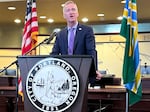
Portland Mayor Ted Wheeler outlines his plan for his final year of office, at Portland City Hall, Sept. 14, 2023. Wheeler will not run for reelection and says he's focused on seeing through voter-approved changes to city government before he leaves office.
Alex Zielinski / OPB
In deciding not to run for a third term in office, Portland Mayor Ted Wheeler opened the door to a new opportunity: a chance to lead the city without the political pressure of a reelection campaign steering his decision-making and dominating his calendar.
As a so-called “lame duck” mayor, Wheeler now has the freedom to tune out the interests of deep-pocketed donors, powerful civic committees or activist groups for the first time since entering office in 2017.
He’s said he wants to use the next 15 months to effectively guide the city through its transition to a new form of government, along with seeing through a few of his office’s newer initiatives to address homelessness, trash and public safety.
“The most important thing I can do right now is not focus on politics, but focus on solutions,” Wheeler said at an hourlong Thursday press conference. “And stepping away from a reelection campaign gives me that opportunity.”
It’s an opportunity many Portlanders are hopeful he’ll seize. After a tenure plagued by crises — ranging from a global pandemic to skyrocketing homelessness to deadly weather events to the death of a City Council member — Wheeler has a chance to exit on a high note.
In a Thursday interview with OPB’s “Think Out Loud,” Wheeler characterized himself as having “platinum armor” after experiencing the various crises. Wheeler, the child of a wealthy timber family, was born and raised in Portland.
He said was humbled by the experience of being mayor, but it was not smooth sailing. Wheeler has been heckled during public events, tear gassed by federal police, attacked online by former President Donald Trump, and become the subject of many critical memes. He’s eager to leave the job’s inherent drama behind.

FILE - A demonstrator holds a police hat above Mayor Ted Wheeler's head at a protest against police brutality and systemic racism in Portland, Ore., July 22, 2020. Wheeler said serving as mayor humbled him and that his tenure was not entirely smooth sailing.
Bradley W. Parks / OPB
Outsiders are watching closely.
“The clock is ticking,” said Amanda Fritz, who served as a Portland city commissioner alongside Wheeler until 2021. “There’s a number of things that Ted has wanted to get done that he has not been able to get done. Now’s the time.”
Previous mayors have used this window of time to fast-track more ambitious — and controversial — policies.
In 2016, four months after announcing he wouldn’t seek a second term, then-Mayor Charlie Hales announced a plan that included allowing unhoused Portlanders to sleep on sidewalks and other city property without being swept. That specific policy was rescinded after a coalition of business groups sued, but Hales managed to keep other pieces intact, like policies allowing people to live in RVs and to run self-organized outdoor villages.
Tera Hurst, who worked as Hales’ chief of staff at that time, recalls that period of time fondly. She spent much of her energy focused on opening Kenton Women’s Village, a cluster of sleeping pods in North Portland reserved for women experiencing homelessness.
“I knew we had a limited amount of time to get it done,” she said, referring to the end of Hales’ term. “Without that pressure and having an end date, you can get caught in bureaucracy.”

FILE - The Kenton Women's Village, seen in this 2017 file photo, opened that year to provide support and temporary housing to homeless women. Building the village was one of the things Portland Mayor Charlie Hales' administration accomplished in his "lame duck" period.
Allison Frost / OPB
After announcing he wouldn’t run again, Hales also pushed to wrap up the city’s negotiations with the city’s police union, a move that spurred raucous protests in City Hall. He also championed a program to make some community centers free during the summers for kids 18 and under, a proposal that Hurst said was met with resistance by some bureau leadership.
“When you’re in that role and you’re running for reelection you can’t do hard things,” Hurst said. “When you’re in that role and not running … you can do those things.”
Hurst is now the executive director of the Oregon Health Justice Recovery Alliance, an advocacy organization focused on successfully implementing Ballot Measure 110. That measure decriminalized small amounts of illegal drugs and directed more money to addiction recovery services.
Related: Measure 110 forced Oregon to build a new addiction services model. Here's how that's going
Local politicians, including Wheeler, have blamed Measure 110 for driving Portland’s deadly overdose rates and emboldening people to use drugs in public. Last week, Portland City Council adopted a policy to arrest people for consuming illegal drugs in public, a decision that won’t be effective unless the Legislature acts to close a loophole. Hurst said that if Wheeler wanted to use his last year in office to truly impact the city’s substance abuse crisis, he would change his tune. That starts with directing the Portland Police Bureau to prioritize arresting people who sell illegal drugs and focus on training officers on how to effectively connect people caught with drugs to recovery services.
“The mayor is at such a good moment to stop talking about criminalizing people and start working on how to best serve the community,” Hurst said. “He could come out and say, ‘Look, these issues have been going on for years and I want to be part of the solution.’”
Those who’ve worked closely with Wheeler believe he’ll use the next 15 months to focus on following through on current projects instead of new initiatives.
“The mayor has always had a clear sense of what he’s wanted to accomplish, and that’s not going to change,” said Michael Cox, who worked as Wheeler’s chief of staff in 2018.
Cox began working for Wheeler in 2014, when Wheeler was state treasurer, and managed Wheeler’s first mayoral campaign. He characterized Wheeler’s final year in office as more of a “fourth quarter” than a “lame duck.”
“He’s found his stride in his methods and priorities in the last few years,” Cox said. “Rather than experimenting with something new, he might focus on completing the items that will make a lasting impact.”

FILE - Portland Mayor Ted Wheeler addresses media during a July 17, 2023, event previewing the first large-scale alternative shelter at the Clinton Triangle in Southeast Portland. The site will offer temporary shelter to up to 200 people experiencing homelessness.
Alex Zielinski / OPB
For Wheeler, that’s making sure the large-scale outdoor homeless shelter he opened this July is effective enough to encourage other landowners to allow similar shelters on their property. It’s also making permanent a temporary program that responds to Portlanders who send complaints about trash, graffiti or homeless camps to the city.
Resolving Portland’s homelessness crisis was a focal point of Wheeler’s first mayoral campaign; he promised shelter for everyone living on Portland streets by the end of 2018. This year, Multnomah County estimated that more than 6,000 people experience homelessness on a given night. While it’s doubtful that Wheeler will be able to meet his initial goal by the end of his term, some see areas where he could go further.
Juliana Lukasik is a spokesperson for Central City Concern, a nonprofit that offers housing, recovery services and other programs to homeless Portlanders. She said Central City Concern leaders want Wheeler to use his final year in office to mend the frayed relationship between the city and Multnomah County, which oversees the region’s behavioral health and shelter programs. The two government bodies have long disagreed over how to best spend public dollars on resolving the homeless crisis, leading to delays and unspent funds.
“We would like to see work done to build a very solid relationship between the city and the county,” Lukasik said. “Like putting the past behind them and really working together in a productive way. The mayor can use his political currency to convene those entities.”
The mayor will lead a meeting with both Portland and Multnomah County commissioners later this month to discuss ways to improve their response to homelessness.
Wheeler doesn’t seem interested in fading into the background in his final months. Along with addressing unsheltered homelessness, Wheeler said he will make the city’s transition to a new form of government a top priority in his final year in City Hall.
Related: Portland's new government will include more administrators, better accountability
In November, Portland voters approved a plan to expand the city council to 12 people, establish voting districts and hire a city administrator. That administrator will oversee city bureaus, a role currently held by council members. That switch is effective in January 2025. Wheeler said he’s “laser focused” on making a smooth changeover that’s void of political influence.
“I think I can be seen as more of an honest mediator and honest broker, if you will, in this process, if I’ve got nothing at stake politically,” Wheeler said. “Because I don’t.”
Former Multnomah County Chair Diane Linn believes Wheeler is taking this responsibility seriously. Wheeler ousted Linn as county chair in 2006, and recalls him working hard to see that programs that began under her tenure stayed intact in the transition.
“He had strong communication skills, and he was focused on getting it right,” Linn said. “Now, I think he is really trying to leverage his leadership without political undercurrent to set the city on the right path. I respect his decision to keep his eye on the ball.”
Politics could still hamper Wheeler’s effectiveness in the near term. While he may not be running for office, some of his colleagues on City Council will be. City Commissioner Mingus Mapps has already announced his campaign for mayor, and others are expected to join the race. According to former Commissioner Fritz, this could derail any ambitious plans his office has in mind.
“If you’re not on the ballot, this is the prime time to get your work done and you want everyone on board to make that happen,” said Fritz, who served on City Council during former Mayor Hales’ last term in office. “But campaigns take a huge amount of time. If your goals aren’t aligned across council, that division only gets intensified by campaign dynamics.”
She recalled instances in which commissioners running for reelection focused on making personal wins to bolster their campaign’s chances, even if those wins derailed other council priorities. This could be complicated by the government overhaul, something none of the previous lame duck mayors had to grapple with.

Portland Mayor Ted Wheeler speaks with OPB's "Think Out Loud" at Portland City Hall, Sept. 14, 2023.
Sheraz Sadiq / OPB
Fritz noted that Wheeler isn’t the only member of council losing their job in 2025.
Under the new government structure, city council members will have a significantly different job description, where they serve more as legislators rather than bureau managers. That means sitting council members only have a short time left if they want to use their position as bureau leaders to direct significant change.
“I think all members of council should be thinking of what they want to get done in the next year,” Fritz said. “It really is every person for themselves.”
Listen to Portland Mayor Ted Wheeler’s full interview with OPB’s “Think Out Loud”:
